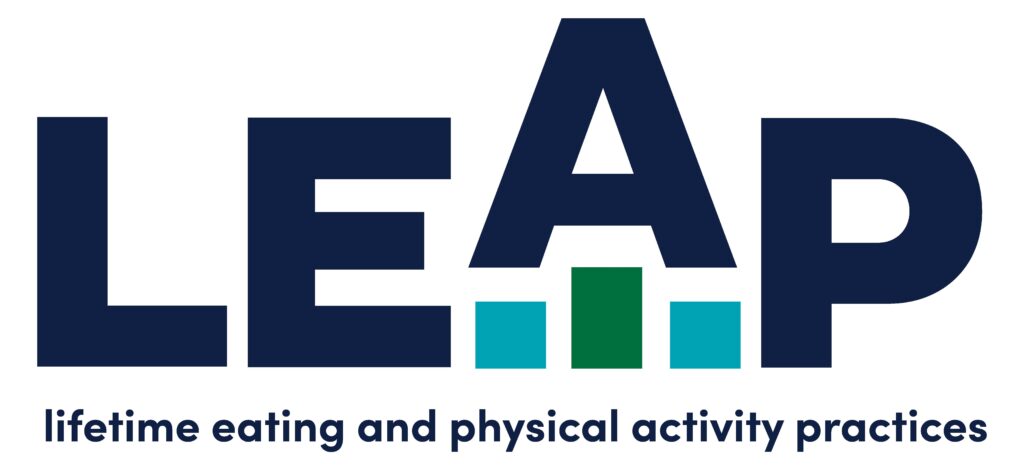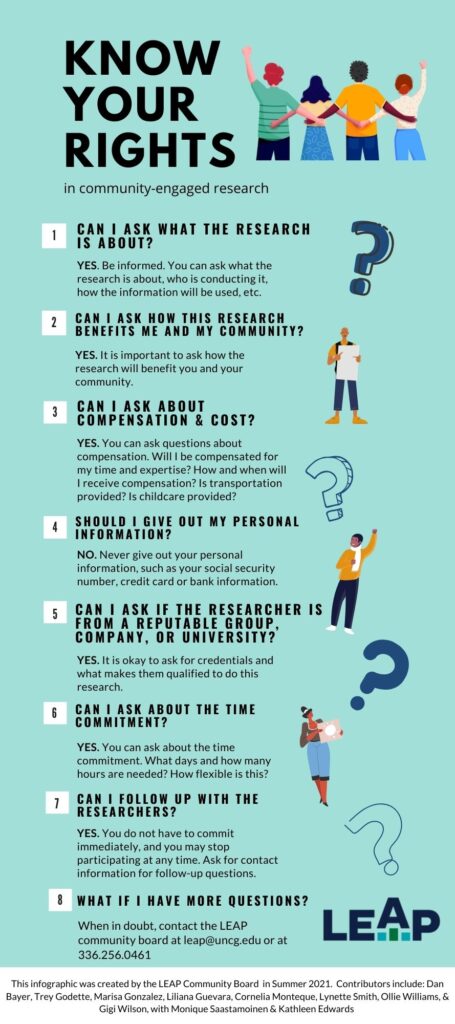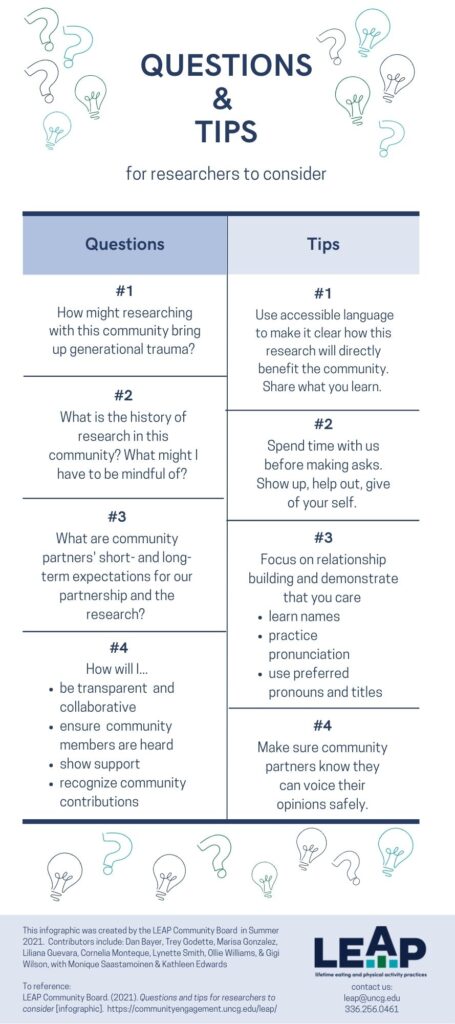LEAP Health & Wellness Collaboration
Jump to Community Board | LEAP Report | Previous Work
VISION: LEAP engages institutions, communities and neighbors in reciprocal partnerships that strive to create a healthy and just Guilford County.
PURPOSE: LEAP’s purpose is to ensure that the work of institutions to advance equity in healthy eating and physical activity are grounded in local data that are meaningful/useful, inclusive, and representative of the people who live here in Guilford County.
MISSION: We seek to improve the quality, quantity, and accessibility of data about healthy eating and physical activity in Guilford County to support effective, equitable, and just community health decisions.
VALUES: Committed to the principle of authentic community engagement, we work through reciprocal partnerships to ask better questions, access and understand better data, come to better answers, share ideas more clearly, and have the greatest impact.
- Who We Are: LEAP is a network composed of professionals and community members in Guilford County with a wide range of expertise and experience related to advancing healthy eating and physical activity practices.
- LEAP Activities: LEAP serves as a point of contact to help people and institutions connect more broadly across the county, particularly as it relates to collecting and using many forms of data from, about, and for local communities. Opportunities to engage include attending InProcess Series, researcher meetings, and consultations with the LEAP Community Board and LEAP researchers.

Watch some of our In Process research series presentations
We developed a new programming series this year, which presented local research studies and information shared from the perspectives of community residents. We offered these evening presentations over Zoom, and they attracted diverse audiences, including healthcare providers, university researchers, students, and community residents. The presentations spanned topics relevant to LEAP’s data priority areas and methods highlighting community-engaged and applied approaches. We recorded these presentations and posted them to YouTube. The presentation recordings have also been shared through our networks.
- “Intergenerational Latinx Health Panel” – Liliana Guevara, Leslie Hernandez, Lesley Summers, Ana Vincent Reyna, and Kathleen Edwards. December 1, 2020, 6pm
- “Redefining Food System Equity: Examining Innovation in Capital Access and Wealth Generation for People of Color” – Hannah Quigley and Karen Jackson, Feb. 2, 2021, 7pm
- “From Home to Healthcare: Modeling and Messaging to Improve Child Health” – Tina Irrer, Coleman Murray, and Lauren Haldeman. March 23, 2021, 7pm
- “Community Boards: Engaging Community Residents in Research and Decision Making” – Trey Godette, Marisa Gonzalez, Cornelia Montaque, and Kathleen Edwards. April 20, 2021, 7pm
Leap Community Board
Comprised of neighbors in the communities we serve, this diverse board allows researchers and service providers access to a robust, standing committee that can provide feedback to plans and provide input to study designs and other strategies to collect community level data. This board is distinct from other types of community boards in that it intentionally represents the various neighborhoods and populations of our community. Board members receive orientation, training, and compensation, per best practices.
Thus far, the board has: (a) provided feedback to the LEAP core research team about the LEAP Report; (b) offered initial ideas and responses for a Cone Health survey; (c) contributed contacts, recommendations, and networking support to two social entrepreneurs looking for residential engagement regarding their food hub proposal; and (d) served as an integral resource for both distributing the COVID-19 survey on healthy eating and physical activity and providing their own observations and field notes to this research.
The Community Boards as Best Practice document provides information about Community Boards, including a definition, benefits, ethical practices, and references. It’s a good place to start if you’re looking to understand the fundamentals of a CB.
Below are two info-graphics co-created by LEAP Community Board members and UNCG partners. These discuss the rights of community members as well as important questions that community-engaged researchers should ask before beginning research in a community. Click each image for the enlarged version.


Click below to learn more about the current LEAP community board members.
Lynette Smith is a native of North East Greensboro who also volunteers with Step Up and the Women’s Research Center. She is passionate about children, cooking, and animals. In her spare time, she enjoys bowling, listening to music, reading, and writing. She wants to contribute new ideas and fresh perspectives.
Trey Godette is a native of Greensboro with strong ties to NCAT and the surrounding North East Greensboro area. He is passionate about connecting people experiencing homelessness and other underserved populations with resources and support and increasing physical activity in the youth. In his spare time, he enjoys watching classic movies, listening to music, traveling, and reading. He is excited to contribute his passion and innovative ideas.
Jo Anne Foster is originally from Burlington but currently resides on the East side of Greensboro. She is passionate about the senior population, helping others, and discussing solutions to community problems. She represents the Mustard Seed Clinic and many faith-based organizations. When not doing community-based work, she enjoys dancing and listening to music.
Cornelia Montaque is a mother, grandmother, and great-grandmother, who is passionate about helping others. She is involved with her church, the Interactive Resource Center, the YWCA, and other organizations serving her local community. She loves to cook for other people, watch old tv shows, and do crossword puzzles.
Ashley Atkinson is a committed mother originally from Georgia but currently resides in North Greensboro. She has a passion for community work and is involved with the Greensboro Housing Authority, NC Works, Guilford County Partnership for Children, and more. She is looking forward to contributing her resources to help the local community live overall healthy lives. In her spare time, she enjoys going to concerts, trying new restaurants, watching movies, and spending time with family and friends.
Gloria McMasters lives in East Greensboro, in the heart of AggieLand. She represents the New Hope Community Development Center and is a member of NACHWs. She is passionate about food deserts, transportation needs for the senior and disabled community, and affordable housing. She supports the food pantries in the community and provides transportation for Seniors to doctor appointments and to the grocery store.
Keith Manley is a Greensboro native with a background in youth development. As a former D1 collegiate athlete, he is passionate about coaching and mentoring at-risk teenagers. In his spare time, he enjoys writing, traveling, and spending time with family. He looks forward to sharing and implementing ideas that could benefit his local community.
Yolanda Ikazoboh is African. She is passionate about the health and safety of immigrants, refugees, and low-income families in the community. She volunteers with UNCG Center for Housing and Community Studies and is a Guilford Parent Leader Network member. In her spare time, she enjoys spending time with family and participating in creative activities.
Kimmerly Walden was born and raised in Lexington, North Carolina but has called Greensboro home for the last fifteen years. She is involved with the nonprofit organization, Hope to Thrive and facilitates a “Paint Your Feelings” class to help people deal with emotional blockages. Her battle with abuse and fibromyalgia has led to her passion for physical, mental, and spiritual health. In her spare time, she loves to spend time with her family and friends, paint, dance, exercise, garden, and go on new adventures of discovery.
Leap Report
A “state of data”, as it relates to healthy eating and physical activity in Guilford County. The LEAP Report shares a year-long process of engaging all types of experts, including our Community Board, to provide a comprehensive view of the state of community-level data – and what we need to move forward. This report shares recommendations for targeting specific indicator areas, strategies for collecting and sharing data, and committing to authentic engagement of communities to identify, collect and use data, particularly data that is about and intended for programs that affect them.
Multiple non-profits, local government offices, health organizations, and community residents contribute to LEAP’s various initiatives. LEAP is guided by a core research team, including Joanie Chavis, Kathleen Edwards, Michelle Gill-Moffat, Becki Haislip, Lauren Haldeman, Michael Hemphill, Jake Hochrein, Karen Jackson, Emily Janke, and Marianne LeGreco.